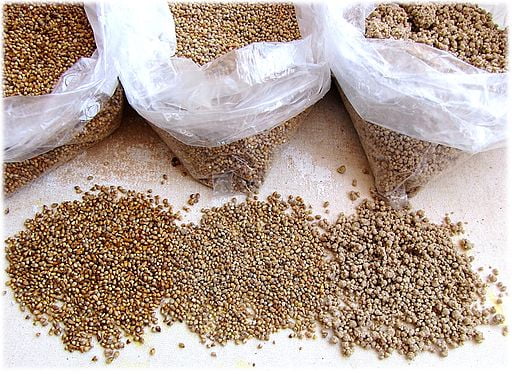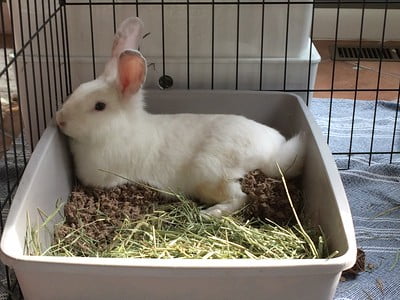Last Updated on February 26, 2023 by Marjon Ramos
Rabbits have been used as test subjects for the effects of candlenuts on hair growth for a possible herbal medicine for alopecia.
So it seems rabbits are able to consume candlenuts without experiencing any immediate adverse health effects.
But, you should still refrain from feeding any candlenuts to your rabbits. They’re too high in fat and there is a risk of aflatoxin toxicity. 105 grams of candlenuts contains 69.6 grams of fat, while rabbits should limit themselves to 20–50 grams of fat per day.
Feeding your rabbits excessive amounts of fat can lead to all kinds of health problems like GI stasis, diarrhea, fatty liver disease, and obesity because rabbits don’t tolerate fatty foods well.
Candlenuts are also reported to contain the Aspergillus fungus, which can produce mycotoxins like aflatoxins.
Aflatoxin poisoning can lead to anorexia, diarrhea, depression, reduced weight gain, and high mortality.
If you notice any changes in your rabbit’s stool, both in size and consistency, or any changes in their behavior after eating candlenuts, immediately bring your rabbit to a veterinarian.
Now that I’ve given you the gist of the article, read on as I explain in more detail why rabbits can’t eat candlenuts:
Table of Contents
Risk of overfeeding candlenuts to rabbits.
Fatty foods like candlenuts should not be fed to rabbits intentionally.
They carry certain risks when fed in large amounts because rabbits’ digestive systems are not really designed to digest large amounts of food like candlenuts.
Here are some of the risks associated with feeding your rabbits large amounts of candlenuts:
Aflatoxin Poisoning
Some candlenuts may have unsafe levels of aflatoxins that can make pets and humans sick.
Rabbits are one of the most sensitive species to aflatoxins, which is why it’s not recommended for them to consume any food that might contain them, like corn, peanuts, candlenuts, cottonseed, and tree nuts.
Here are the most common symptoms of aflatoxin poisoning in rabbits:
- Diarrhea
- Anorexia
- Jaundice
- Loss of appetite
- Reduced weight gains
- High mortality
- Depression
If you notice or suspect that your rabbit might be suffering from aflatoxin poisoning, immediately call your veterinarian or the animal poison control hotline.
Fatty liver disease
Most candlenuts are high in fat, feeding your rabbits candlenuts long-term could lead to hepatic lipidosis, or fatty liver disease.
Rabbits should limit themselves to 20-50 grams of fat per day, while 100 grams of candlenuts contain 69.6 grams of fat.
Here are the signs that your rabbit might be suffering from fatty liver disease caused by excess fat:
- Loss of appetite (anorexia) – may be sudden or gradual.
- Weight loss
- Decline in number and size of droppings (feces)
- Dehydration
- Depression and lethargy
Diarrhea
Diarrhea in rabbits is often caused by the wrong diet or rapid changes in diet.
Feeding your rabbit large amounts of candlenuts would check those two boxes I mentioned.
Gastrointestinal Stasis
Gastrointestinal stasis is also possible when a rabbit is fed large amounts of candlenuts, which are high in fat.
GI stasis mainly happens when a rabbit is fed a low-fiber diet.
GI stasis happens when the balance of bacteria in your rabbit’s gut is disrupted.
This disruption would cause painful gas that would eventually lead to organ failure and death if not treated immediately.
The signs of GI stasis are:
- Depressed
- Hunched posture
- Bruxism
- Decreased appetite/anorexia
If you notice any of these signs, immediately bring your rabbit to a veterinarian.
Uneaten cecotropes
Soft uneaten cecotropes are also possible when rabbits are eating large amounts of candlenuts instead of hay.
This could lead to softer cecotropes due to the lack of fiber in your rabbit’s diet.
Obesity
Obesity in rabbits is also possible when fed large amounts of fatty or sugary food.
Rabbits that are confined in cages all day without exercise and fed large amounts of high-carb, low-fiber diets are the most susceptible to obesity.
Healthy alternative to candlenuts as treats.
If you’re planning on giving your rabbits candlenuts as treats, these alternatives are much healthier:
- Melon
- Nectarine
- Apple (remove seeds)
- Banana
- Papaya
- Peach
- Blueberries
- Blackberries
- Pear
- Strawberries
- Raspberries
- Cranberries
- Pineapple
- Plum
- Watermelon
- Cherries (remove seeds)
- Grapes
- Orange
FAQ (Frequently Asked Questions)
Should you panic if your rabbit eats a little bit of candlenuts?
Observe your rabbit for any additional symptoms like loss of appetite, depression, jaundice, and diarrhea.
You can also call the poison control hotline if you suspect or are worried that your rabbit is experiencing intoxication.
What to do if your rabbit ate candlenuts?
Observe your rabbit’s behavior and poop for any changes.
You should also feed them a lot of hay.
The extra fiber would help balance their gut flora.
If you notice any changes in their poop or behavior, consult a veterinarian immediately.
Conclusion
Candlenuts should never be fed to rabbits intentionally because they could potentially contain aflatoxins.
Candlenuts are also high in fat, which could lead to digestive problems in large amounts.
If you suspect or are worried that your rabbit might be suffering from aflatoxin poisoning, call your veterinarian or your animal poison control hotline.
Cite this article:
Sources
- Postharvest Fungi Attack on the Candlenut (Aleurites moluccana)Distribution Chain in Several Areas at North Sumatra
- Mycotoxins
- Candlenuts
- Comparison of the Effects of Aloe vera L and Aleurites moluccanus, in Single and Mixed Forms in Promoting Hair Growth
Image credit- ChildofMidnight at English Wikipedia, CC BY 3.0 https://creativecommons.org/licenses/by/3.0, via Wikimedia Commons




